Consider the Sparrows
“Are not two sparrows sold for a penny? Yet not one of them will fall to the ground outside your Father’s care.” Matthew 10:29
There is great drama in the order of things; quite often a tragedy of grand proportion unfolds before one’s very eyes, if one can keep her eyes are open long enough to take a good look. I watch a spectacle unfold each morning at the bird feeder in my yard, pecking order tight and unyielding, rules clearly defined. Nature works like that, its lines are unimpeded, its codes unflappable.
Birds of all types abound in my small side yard, and they storm fearless the moment I bring the birdseed, flitting and flapping and helping themselves to the easy food, the metal feeder hanging solid in the angled shade of my roof. The birds are not afraid of me anymore – I show up most days. They wait patiently in branches and eaves for the few seconds it takes for me to fill the feeder each morning, then flutter fast to the food just as the screen door slams safely behind me.
The sparrows always arrive first and they are plenty. These simple house sparrows share the seed. They flit and float about for a place to perch (my feeder is not large), but they do not fight much. Some gather on the dirt below for the seeds that fall, others find a place on the hard metal ledge of the feeder as it swings in the breezes of each season, but there is little argument. I neither see nor sense any dissension. I buy my birdseed in bulk, and these sparrows seem to understand the nature of such abundance, they realize there’s plenty to go around.
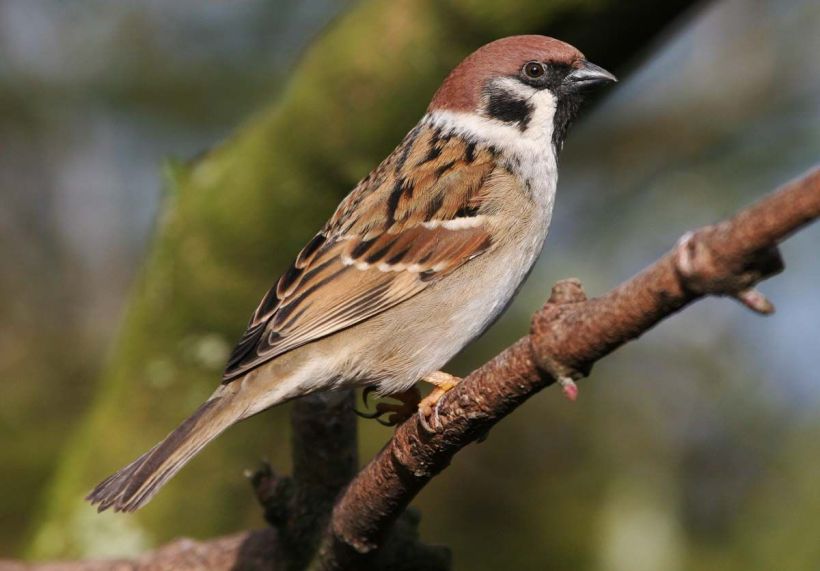
The doves understand this less. They always arrive just after the sparrows. I hear them first in the mornings, their gentle cooing precedes their arrival. I can see them from my chair on the back porch as they perch on my neighbor’s triangled roof and spy on the unsuspecting sparrows, planning attack strategies.
Doves are bigger and much heavier than mere house sparrows. The average house sparrow weighs just a few ounces, barely heavier than a feather, while an average dove weighs around five ounces and is almost double in length to a sparrow – around these parts, anyway. The time comes, as it always will, for the dove’s attack. She flies from her perch on the roof and lands heavy on the feeder, scattering sparrows and seeds akimbo. The dove eats what she will, when she will. The sparrows stay below on the ground, taking what she scatters and wastes, waiting.
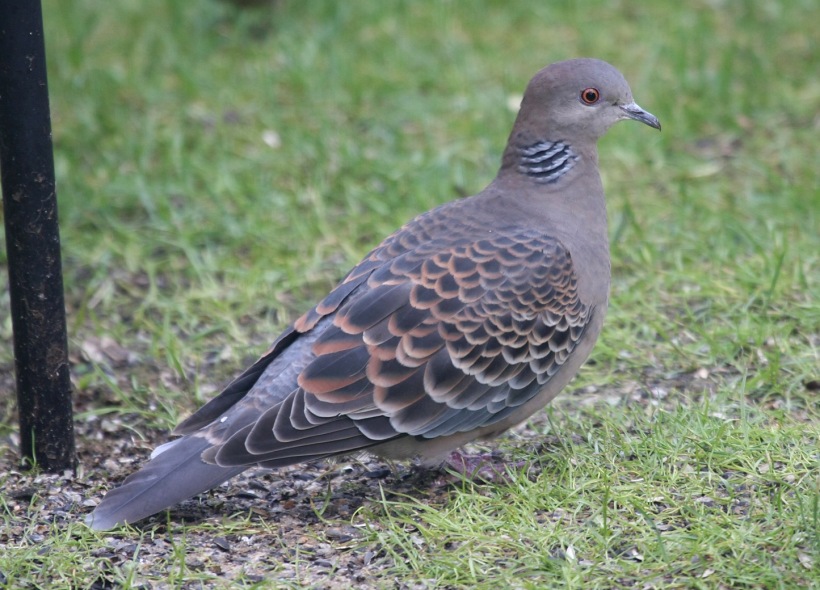
Cardinals arrive next in their fire-engine-fury and scare the doves away, pushy redbirds these. Bullies. The doves must flee the cardinals, yes, but not without proper protest, their noisy high-pitched cooing meaningless to the new set of bullying birds, who feed steadily and hurriedly until some predator comes for them – the way of the world.
Now it is the blue jay’s turn. He arrives in grandeur with his majestic blue crest and white chest, his royal plumed head turned tall in its finery. No bird seems prepared to stand up to him, none as beautiful or grand, not at this feeder anyway. Each species that arrives is weightier and grander than the one preceding it. As long as there is no crow or chipmunk in the neighborhood, the blue jay stays a while, eating his fill.
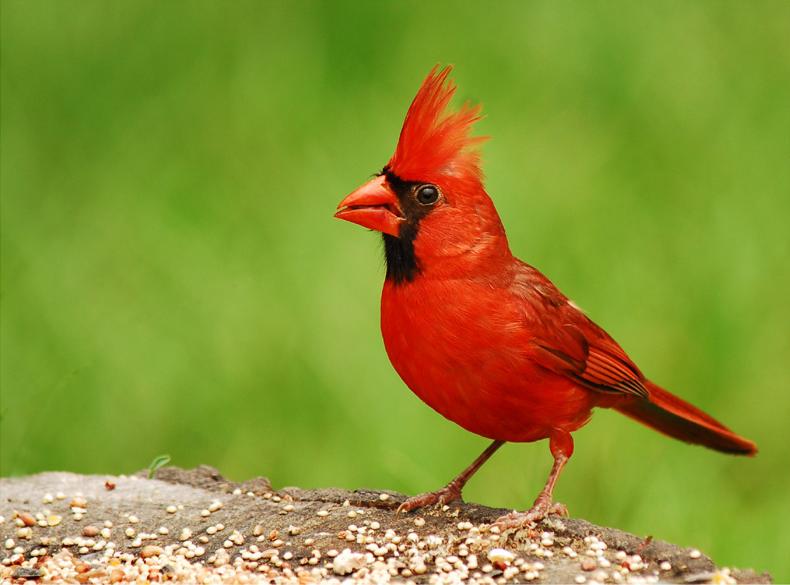
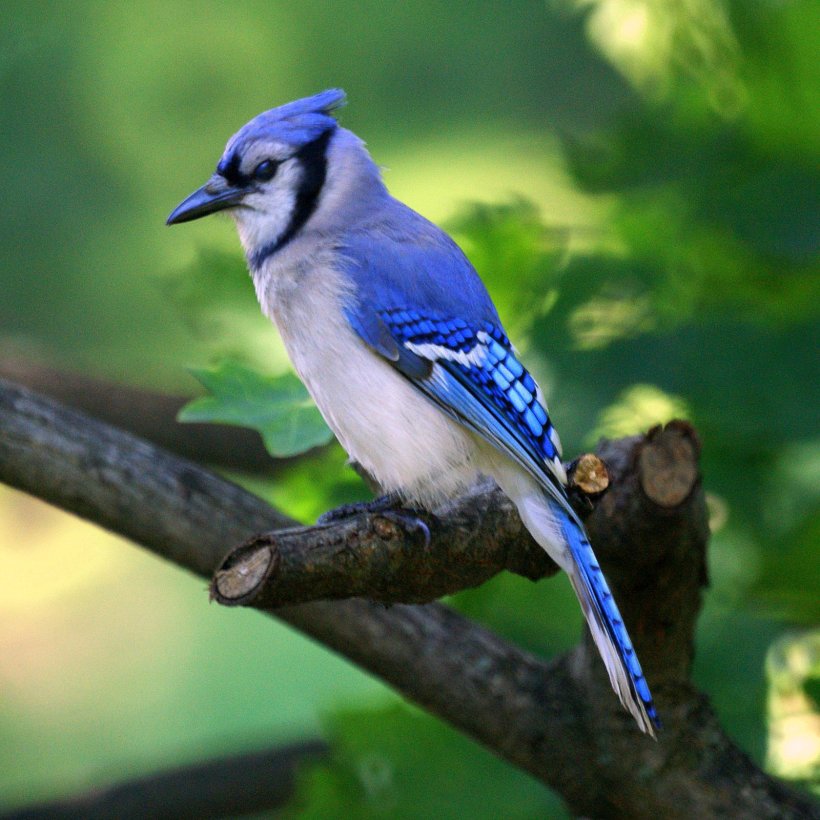
Soon enough every bird seems to grow bored with the process or the food runs out, for eventually they all fly away to other feeders, greener pastures, better seed selection.
All except the sparrows.
All along, throughout the entire procession of the bigger bully-birds, this spectacle of the more threatening, more beautiful species, the sparrows have waited patiently, some in hiding but most standing just slightly off to the side, and they are everywhere – on the ground, in the bushes, on the trees. They sit to wait and watch. When all of the bigger birds are fed and move on to grander climes, the house sparrows return peacefully to the feeder and eat, as if being overpowered by the stronger is of no consequence at all.
As if it never even happened. Accustomed they are to this pecking order and they seem to be at peace with it.
If there is no seed left, then I simply refill the feeder. As I said, the sparrows seem to understand the idea of abundance and scoot out of my way as I come, seed in hand.
The sparrows offer no thanks for my contribution, but I am privy to the chittering and clicking of their feeding. I wonder if I will ever understand their song.
I find the pecking order at my yard feeder hard to stomach and a bit difficult to watch; its ugly pushiness seems more of a disorder to me. The larger shove the smaller, the prettier trump the plainer, the stronger peck the weaker; it is indeed survival of the fittest out there in the garden, at the mere feeder under the eave of my home. Bullies make demands, they want what they want, when they want it, and they push hard until they have it. They will achieve it.
These house sparrows do not seem to mind. I ask them how they accomplish this with such peace of mind, but they do not answer.
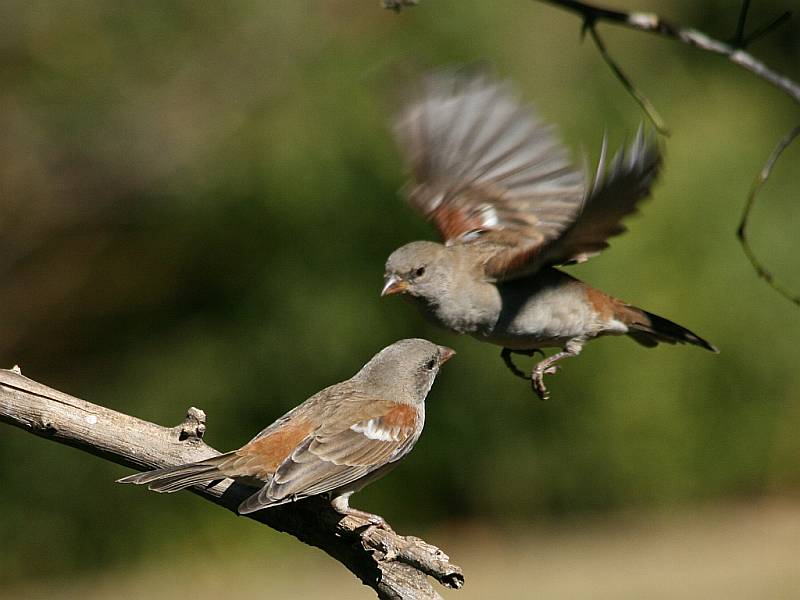
I can forget about the sparrows in the winter. Most common house sparrows do not migrate in the winters, especially down South where our winters are mild, relatively speaking; so the sparrows stick around. I don’t know where they roost or why their song is so still in the cold months, but they are here, quiet or not. I think of them occasionally in the winter, rising from the warmth of my sleepy couch to give them a bit of seed, but it’s sporadic, I’m afraid. They fend for themselves without fear on cold, dark days, for they have stored up for the winter. Yet when I do show up, seed in hand, they gather at the feeder and wait for me to fill it. They neither toil nor spin, no worry or angst seems to invade their patient chirping. They do not even scold my forgetfulness, they are very patient with me. They simply eat what is given.
Where are your bullies now, sparrows? Do they push you from your feeder and steal your seed in winter like they do in summer? I do not see them in winter, seldom does a cardinal or blue jay show up to the feeder in the cold, no doves, no crows. Even the chipmunk stays away, somewhere munching on buried pecans, or asleep.
Sparrow, are you alone in the winter or are you bullied in the quiet shadows? Do your enemies leave you solitary in the cold or are they merely harder to see? Do they ever just go away?
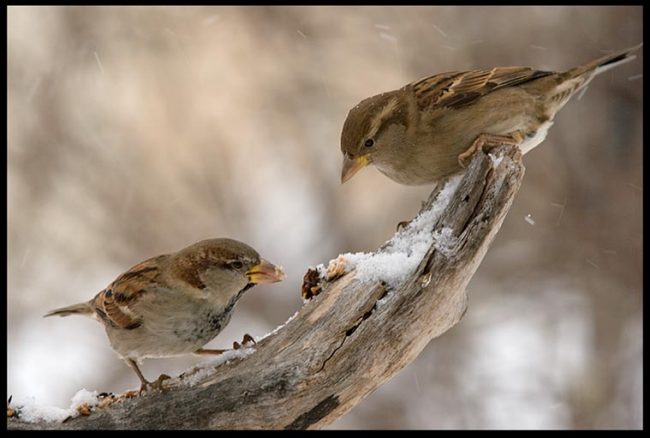
I need to know because I have a personal stake in this game.
One day an enemy-bird flies up unannounced to the feeder where I feed, where I’ve been spending my long days and years in what I thought was relative safety, just munching on seed and soaking up a little sun. Reading a book, writing a story or two. I do not see him coming for I have sensed no need to be watching my back. I think he has been perched on my neighbor’s roof for a while, planning his attack, but I cannot be sure.
What surprises me the most is the ease of the assault, the sheer speed of it all, just like the swooping in of the grand blue jay among the humble sparrows. Whoosh. One phone call, one poorly written email or a letter not written at all seems to be all it takes to acquire an enemy these days, one misunderstanding and all communication breaks down completely.
I guess it has always been that simple. I should have seen this coming – I read. Othello has his Iago, David his Saul. It is still a great shock to my system, I must say, as I have been quite oblivious to enemy activity in my area for most of my days.
Enemies are for other people.
But my hour comes round at last, as everyone’s does. My enemy-bird arrives and he is hungry, demanding to be fed, pushing and pecking, and I realize I am completely unprepared, no weapon honed for such an assault, no quiver from which to pull a ready arrow. Not a single bow in sight.
How should I then live?
Maybe I should try acting like the simple yard sparrow, flitting here and yon and staying out of the way, low to the ground, just trying to wait it out. Hiding in shadows, trying to be unseen. But this doesn’t always work well, I’m learning. The enemy pokes and prods, talks and squawks and tries to flush me out of my hiding places.
Maybe I should try acting like a dove when the cardinal arrives, shaking my fist and protesting, trying to have my story be heard. Listen to me, there is another story here, listen to me, I sing and squawk and sing. But it does not work. No one hears my song, for my enemy doesn’t care and his squawk is louder. He is simply stronger and more colorful and has more energy than I can muster.
I have no wings prepared for such a battle.
I try one more tactic, a human one this time. I try to reason with the enemy-bird, tell him my side, try to listen with empathy, try to smooth things over and find a peaceful branch where we both can perch, or at least a common tree. Everything I do makes it worse. The enemy-bird flies away more angry than before and I realize, for the very first time in my life, that I am no peacekeeper.
Worse, I am no peacemaker. (I had always thought I was.)
Humans are not sparrows and I am no god to fix this universe.
Reading once, I come across this doozy in Matthew 5 –“But I say unto you, Love your enemies, bless them that curse you, do good to them that hate you, and pray for them…” Pray for your enemies? Love them? Bless them that curse you and do good to them? Who can do this, what does this even mean?
I teach at a wonderful Episcopal school where we have chapel every day, and at the end of each service we kneel to say the school prayer – a quiet act of praise, a time to pause, and to bend.
Kneeling this day, I forfeit the school prayer and ponder instead this idea from Saint Matthew – Do good to your enemies. I wonder to God, how can I do this? I am estranged from my enemy. How can I accomplish such a task as loving my enemy when I do not even see him? – I just hear of the cruel words and jibes that remain, floating ever-aloft in the constant sky overhead.
If I quiet, if I will, sometimes I can hear whispers of response, answers blowing around in stillness.
This day I hear God in a quiet voice that sounds like young girls praying, chanting a school prayer – “Almighty God, Fountain of all wisdom, be with us, we pray thee, in our work today…”
Your work for today is to look to your left, the Voice prompts, so I look left. Beside me, across the aisle, sit the littlest among us, the fifth grade girls. Heads bowed, fingers laced, they kneel to pray – and I look, gaze hard at their innocence, the moving of lips and reverence collective.
God speaks, I can hear it and feel it in my soul, deep deep down – You can love your enemy by loving his children. Love the children. If you cannot yet pray for your enemy, if you cannot do good to him because he will not let you or you simply do not want to, then start by praying for his children.
Try paradox. Do what an enemy would not do. Be kind to those who have hurt you – pray for his child. I bend my tired back, try to relax my wounded shoulders, open my mouth in faith and hope for words to come.
Very often words precede feeling.
I pray for the children of my enemy. As the words cross my lips, I soften (albeit just a little). The children – Christ reminds me that the kingdom of God is made up of such as these.
When cruel words resurface, as cruel words always will, I bend and pray for the children of the slanderer.
When hate overwhelms and consumes, I bend and pray for the children that love will permeate their lives and the adult’s anger will find no home in them.
Where I could not accomplish peace, I bend and pray the children will develop peaceful relationships, honest conversations, I pray for their protection from the anxiety of hatred. I pray for love, for them and for me.
When I taste the cruelty and relentlessness of the enemy, when I am reminded of this bitterness and taste it afresh on my tongue, then I bend and pray for his children.
It’s a start.
(I will write more about this.)

Simply beautiful!! Steadfast love wins.
LikeLiked by 1 person
Thanks, Brandon. It really does. It never fails.
LikeLike
Love this. Hope the next chapter is soon. Love you.
LikeLiked by 1 person
Thank you. Love you so much.
LikeLike
i so love reading your thoughts and your words. it’s a privilege really. all my love!
LikeLiked by 1 person
Thanks ~ love right back to you!
LikeLike
What an inspired place to start–the children! They are blessed with your prayer. Thanks, as always, for sharing your thoughts and feelings.
LikeLiked by 1 person
Love you, Jean. Thanks for reading and thanks for your unending encouragement.
LikeLike
Well written, Shari,
I have come across all the birds you mentioned – the sparrows, the doves, the cardinals, and, yes, even some of the jays. We should all take time for the birds.
Let’s all sing like the birdies sing, tweet tweet tweet , tweet tweet tweet, Let’s all sing like the birdies sing, sweet sweet sweet sweet sweet.. Let’s all warble like nightingales, give your throat a treat. Take your time for the birds, now you know the words, TWEET TWEET TWEET TWEET TWEET! JON
On Mon, Nov 13, 2017 at 4:34 PM, roll the boulder wrote:
> shari brand ray posted: “Consider the Sparrows “Are not two sparrows sold > for a penny? Yet not one of them will fall to the ground outside your > Father’s care.” Matthew 10:29 There is great drama in the order of > things; quite often a tragedy of grand proportion unfolds ” >
LikeLike